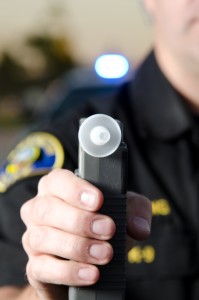 What to Expect When Pulled Over for DUI in South Florida
What to Expect When Pulled Over for DUI in South Florida
Call West Palm Beach DUI Defense Lawyers at the Feuer Law Firm
In Florida, Driving Under The Influence of alcohol beverages, or any chemical substance set forth in Florida Statute § 877.111, or any substance controlled by Chapter 893 of the Florida Statutes, may be proven in one of two ways.
To prove the crime of Driving under the Influence, the State must prove the following two elements beyond a reasonable doubt:
IMPAIRMENT OF NORMAL FACULTIES:
- The Motorist drove or was in actual physical control of a vehicle.
- While driving or in actual physical control of the vehicle, the Motorist was under the influence of alcoholic beverages (or chemical substance or controlled substance) to the extent that his or her normal faculties were impaired.
Normal faculties include but are not limited to the ability to see, hear, walk, talk, judge distances, drive an automobile, make judgments, act in emergencies and, in general, to normally perform the many mental and physical acts of our daily lives.
DRIVING WITH AN UNLAWFUL BREATH-ALCOHOL LEVEL (DUBAL):
- The Motorist drove or was in actual physical control of a vehicle.
- While driving or in actual physical control of the vehicle, the Motorist had a Blood-Alcohol or Breath-Alcohol level of .08 or more.
Florida Statute § 316.1932 provides that anyone who accepts the privilege of operating a motor vehicle in the State of Florida is deemed to have given his or her consent to submit to an approved chemical test or physical test including, but not limited to, an infrared light test of his or her breath for the purpose of determining the alcoholic content of his or her blood or breath if the person is lawfully arrested for any offense allegedly committed while the person was driving or was in actual physical control of a motor vehicle while under the influence of alcoholic beverages.
The chemical or physical breath test must be incidental to a lawful arrest and administered at the request of a law enforcement officer who has reasonable cause to believe such person was driving or was in actual physical control of the motor vehicle within this state while under the influence of alcoholic beverages. The administration of a breath test does not preclude the administration of another type of test.
BREATH TESTING:
Law enforcement agencies in the State of Florida must utilize an “approved test” in order to comply with the Implied Consent regime of laws. Florida’s Administrative Code specifies that the “Intoxilyzer 5000” and the “Intoxilyzer 8000” are approved for breath testing.
The actual breath testing, in order to be admissible in court, must be according to a checklist set forth by the Florida Department of Law Enforcement, and published in Form 37.
Florida Administrative Code § 11D-8.002(12), sets forth that in order to be an “Approved Breath Test,” or a breath test that may be admitted into evidence in a DUI trial under the Implied Consent regime of laws, the test must meet the following criteria:
A minimum of two samples of breath collected within 15 minutes of each other, analyzed using an approved breath test instrument, producing two results within 0.020 g/210L, and reported as the breath alcohol level. If the results of the first and second samples are more than 0.020 g/210L apart, a third sample shall be analyzed. Refusal or failure to provide the required number of valid breath samples constitutes a refusal to submit to the breath test.
The term “Breath Alcohol Level” – is defined as “the alcohol concentration by weight in a person’s breath based upon grams of alcohol per 210 liters of breath (g/210L).”
BLOOD TESTING:
There are several ways for Blood testing to occur in the course of a DUI investigation.
THE MOTORIST ASKS TO GIVE A BLOOD SAMPLE AFTER A BREATH TEST:
Any person who has submitted to a test of his or her blood, breath or urine has a right to have an independent test performed. Florida Statute § 316.1932(1)(f)(3) sets forth:
The person tested may, at his or her own expense, have a physician, registered nurse, other personnel authorized by a hospital to draw blood, or duly licensed clinical laboratory director, supervisor, technologist, or technician, or other person of his or her own choosing administer an independent test in addition to the test administered at the direction of the law enforcement officer for the purpose of determining the amount of alcohol in the person’s blood or breath or the presence of chemical substances or controlled substances at the time alleged, as shown by chemical analysis of his or her blood or urine, or by chemical or physical test of his or her breath. The failure or inability to obtain an independent test by a person does not preclude the admissibility in evidence of the test taken at the direction of the law enforcement officer. The law enforcement officer shall not interfere with the person’s opportunity to obtain the independent test and shall provide the person with timely telephone access to secure the test, but the burden is on the person to arrange and secure the test at the person’s own expense.
THE MOTORIST HAS BEEN INVOLVED IN AN ACCIDENT INVOLVING SERIOUS BODILY INJURY TO ANOTHER:
In the event the motorist has been involved in a car accident, where it appears that someone has suffered serious bodily injury, and the investigating officer has cause to believe that the motorist is DUI, the police may compel a blood draw, without the actual consent of the motorist, and by force, if necessary. Testing under this scenario does NOT require the arrest for DUI to have occurred prior to the blood-sample being taken.
THE MOTORIST HAS BEEN TAKEN TO THE HOSPITAL AND IT IS IMPRACTICAL TO GIVE A BREATH TEST:
In the event the motorist suspected of DUI is unable to be taken to the facility where breath testing occurs, because it would interfere with medical treatment, the investigating officer may lawfully request a blood sample under the Implied Consent regime of laws. Testing under this scenario does NOT require the arrest for DUI to have occurred prior to the blood-sample being given. Florida Statute § 316.1932(1)(c) sets forth that :
Any person who accepts the privilege extended by the laws of this state of operating a motor vehicle within this state is, by operating such vehicle, deemed to have given his or her consent to submit to an approved blood test for the purpose of determining the alcoholic content of the blood or a blood test for the purpose of determining the presence of chemical substances or controlled substances as provided in this section if there is reasonable cause to believe the person was driving or in actual physical control of a motor vehicle while under the influence of alcoholic beverages or chemical or controlled substances and the person appears for treatment at a hospital, clinic, or other medical facility and the administration of a breath or urine test is impractical or impossible. As used in this paragraph, the term “other medical facility” includes an ambulance or other medical emergency vehicle. The blood test shall be performed in a reasonable manner. Any person who is incapable of refusal by reason of unconsciousness or other mental or physical condition is deemed not to have withdrawn his or her consent to such test. A blood test may be administered whether or not the person is told that his or her failure to submit to such a blood test will result in the suspension of the person’s privilege to operate a motor vehicle upon the public highways of this state and that a refusal to submit to a lawful test of his or her blood, if his or her driving privilege has been previously suspended for refusal to submit to a lawful test of his or her breath, urine, or blood, is a misdemeanor.
Florida Administrative Code § 11D-8.002(11), sets forth that in order to be an “Approved Blood Test,” or a blood test that may be admitted into evidence in a DUI trial under the Implied Consent regime of laws, the test must meet the following criteria:
Approved Blood Alcohol Test – the analyses of two separate portions of the same blood sample using a Department-approved blood alcohol test method and a Department-approved procedure, with results within 0.010 grams of alcohol per 100 milliliters of blood (g/100mL), and reported as the blood alcohol level.
The term “Blood Alcohol Level” is defined as “the alcohol concentration by weight in a person’s blood based upon grams of alcohol per 100 milliliters of blood (g/100mL).”
URINE TESTING:
Typically, an investigating officer will request a urine sample from someone who has taken a the breath test and either registered no presence of breath-alcohol or registered a breath-alcohol level that is not consistent with the degree of impairment the officer believes he or she has observed.
In cases where the breath test has yielded a low result that is inconsistent with the level of impairment that the investigating officer believes he or she has observed, the officer will often request that a “Drug Recognition Expert” (DRE) respond to assist in the investigation. DRE which is a title bestowed upon officers who have completed a an additional training course in the detection of types of impairment. An officer who is a DRE is not a doctor or nurse by virtue of taking the additional DRE course. A DRE officer will offer the motorist a new set of physical exercises and seek to record more of the physical signs of impairment, such as pulse, pupil response, muscle tone, and blood pressure.
Prosecuting cases where the only scientific evidence of impairment by a chemical or controlled substance is a urine sample can be problematic for the State. The toxicologist that the State will invariably call to testify will have to admit that a urine sample will only confirm the presence of a substance and NOT whether the person was under its influence at the time he or she was driving.
